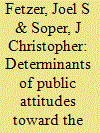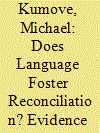|
|
|
Sort Order |
|
|
|
Items / Page
|
|
|
|
|
|
|
| Srl | Item |
| 1 |
ID:
107446


|
|
|
|
|
| Publication |
2011.
|
| Summary/Abstract |
This article investigates the current attitudes of the Taiwanese public toward
the rights of aborigines (Yuanzhumin), a neglected topic both in Taiwan and
throughout the world. The theoretical literature on ethnic politics suggests that
such attitudes might be rooted in one's level of education, ethnic group conflict
and partisanship, intergroup contact, and/or religion-like ideology (Confucian
values). Using data from the 2006 Taiwan Social Image Survey I and our 2009
privately commissioned poll on support for the rights of Taiwanese aborigines,
we test these four theories and find that higher education increases support
for aboriginal rights. The results confirm the ethno-partisanship model for
2006 but not for 2009. Conversely, the percentage of Yuanzhumin living in
a region boosted hostility toward them in 2009 but not in 2006. We likewise
discover that two Confucian values (family loyalty and social hierarchies)
have no statistically significant effect on attitudes toward Yuanzhumin. A
third key Confucian value, social harmony, appears to increase support for
aboriginal rights. Surprisingly, Confucian values seem to pose no hindrance
to the advancement of ethnic minorities' rights and may, in fact, even promote
them.
|
|
|
|
|
|
|
|
|
|
|
|
|
|
|
|
| 2 |
ID:
102513


|
|
|
|
|
| Publication |
2011.
|
| Summary/Abstract |
In the past few decades, planned contact interventions between groups in conflict have played an important role in attempts at improving intergroup relations and achieving peace and reconciliation. This article focuses on such reconciliation-aimed intergroup encounters between Israeli Jews and Palestinians that seek to reduce hostility and increase understanding and cooperation between the two nationalities. Like other contact interventions conducted in settings of intergroup conflict, encounters between Israeli Jews and Palestinians represent a paradoxical project: this is a project that aspires to generate equality and cooperation between groups that are embedded in a protracted asymmetrical conflict. Though existing research teaches us valuable lessons on the effectiveness of contact conducted under optimal conditions, little is said about contact between groups involved in asymmetrical protracted dispute. The goal of this analysis is to examine the evolution of reconciliation-aimed contact interventions between Israeli Jews and Palestinians in the past 20 years. The research method is qualitative, relying on ethnographic data assembled during the relevant period of time. The findings identify and trace the evolution of four major models of Jewish-Palestinian planned encounters: the Coexistence Model, the Joint Projects Model, the Confrontational Model, and the Narrative-Story-Telling Model. The strengths and limitations of each model in transforming intergroup attitudes in asymmetric conflict are discussed.
|
|
|
|
|
|
|
|
|
|
|
|
|
|
|
|
| 3 |
ID:
186327


|
|
|
|
|
| Summary/Abstract |
Despite a surge in research on post-conflict reconciliation, the specific factors which promote reconciliation remain a subject of debate. In particular, the possible role of shared language in fostering reconciliation has received little scholarly attention. This paper examines two possible channels through which shared language may facilitate reconciliation, and tests these using a new survey dataset of 446 individuals from Serbia. As expected, the results indicated that shared language reduces the negative effect of conflict on intergroup trust and friendship, two crucial components of reconciliation. Furthermore, the results suggest that in the former Yugoslavia this effect is generated by the communication-enabling aspects of a shared language, rather than its other properties such as acting as a marker of ethnic or cultural identity.
|
|
|
|
|
|
|
|
|
|
|
|
|
|
|
|
| 4 |
ID:
180269


|
|
|
|
|
| Summary/Abstract |
Social distance,’ and ‘social distancing’ have become the linguae francae of our world ravaged by COVID-19. Pandemic related social distancing prescriptions, however, do not operate in a vacuum. How do social distancing strategies for containing the pandemic intersect with extant social divisions? Using a unique census-scale micro-dataset from rural Karnataka (an Indian state as large as France), we meditate on this question by drawing on theoretical insights from multiple disciplines including the intellectual genealogy of ‘social distance’ as a measure of social divisions. Our rich dataset contains independent India’s first census-scale enumeration (n ≈ 36.5 million) and coding of elementary caste categories (≈700 jatis). Our dataset is also the first to combine self-reported jati and religion information. To the best of our knowledge, we present the first systematic large-n portrait of intra-village residential segregation in rural India. Our micro-segregation analysis along jati and religion axes provides evidence for a ‘permanent cordon sanitaire.’ Our analysis also sheds light on how the pandemic intersects with internal migration trajectories in India.
|
|
|
|
|
|
|
|
|
|
|
|
|
|
|
|
|
|
|
|
|